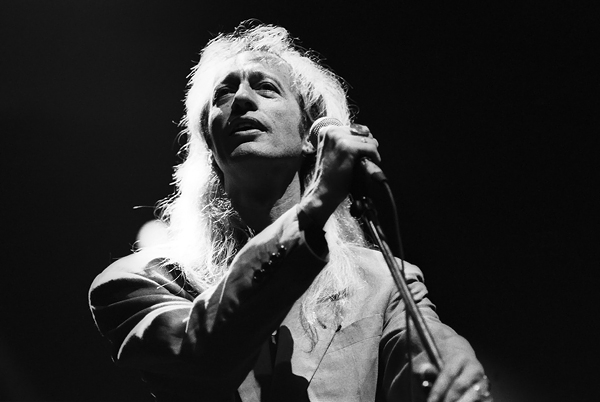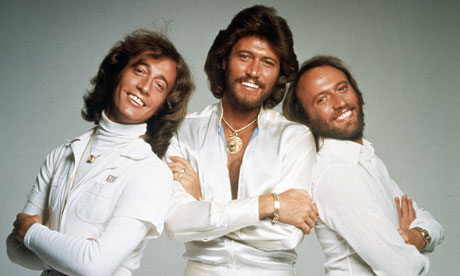






Robin Gibb, who has died aged 62, was one of the three brothers who made up the international chart-topping group the Bee Gees. They were best known for their disco hits of the 1970s, which included Stayin' Alive, Night Fever and Jive Talkin', but enjoyed success in every decade from the 1960s to the 2000s. Robin also charted intermittently as a solo artist. He released six solo albums between 1970 and 2006, and scored a British No 1 single as recently as 2009 with a new version of the Bee Gees' song Islands in the Stream, for Comic Relief.
He was born on the Isle of Man, twin brother of Maurice, and son of Barbara, a former singer, and Hugh Gibb, a bandleader. The family moved to Chorlton, Manchester, in the 1950s. Robin, Maurice and their older brother, Barry, took to music early and made their first appearances onstage as a between-shows act at cinemas, in Manchester, in 1955. In 1958 the family moved to Brisbane, Australia, where the trio performed as the Brothers Gibb. They were given their own local TV show and changed their name to the BGs, which later became Bee Gees, and in 1962 signed to Festival records.
"We wanted to make music all our lives and it evolved to a point where the only people who could understand that were the three of us," Robin said. "We didn't feel comfortable with anybody but ourselves. The three of us were like one person."They had begun writing their own material, but suffered a string of flops before finally achieving a modest hit with Wine and Women. In late 1966, well aware of the pop-music boom happening in Britain, they moved back to their original homeland. Ironically, their song Spicks and Specks then topped the Australian charts. Meanwhile, they impressed Robert Stigwood, a pop entrepreneur who had become a partner in the Beatles manager Brian Epstein's Nems organisation. Stigwood became their manager, and, in 1967, the trio scored their first international hit with New York Mining Disaster 1941, which made No 12 in the UK and No 4 in the US.
This launched a string of memorable pop ballads, including To Love Somebody, Massachusetts (their first UK chart-topper) and Words. They made their debut album, Bee Gees 1st, in 1967, followed by Horizontal and Idea, which they also produced.
Not long after returning to England, Robin met Molly Hullis, who worked at Nems, and became his first wife. Both of them were involved in the Hither Green train crash in south-east London in November 1967. "I just wanted to escape," said Robin. "At the same time I made a mental decision that it wasn't going to affect my life, so I shut it out."
The Bee Gees made rapid commercial progress, but this was suddenly halted during the making of their 1969 double-LP, Odessa. There had already been rivalry between Robin and Barry over which of them was lead vocalist. Now, after an argument over whether Robin's Lamplight or Barry's First of May should become the A-side of their next single, Robin walked out on his brothers and set about recording the solo album Robin's Reign, on which he wrote, produced and sang all the material. It resulted in the 1969 hit Saved By the Bell. Meanwhile, the other two singers made the next Bee Gees album, Cucumber Castle, before following Robin into solo work. The influence of fame, drugs and money had had a corrosive effect on fraternal harmony.
In 1970, the brothers realised that they were stronger together and reformed the Bee Gees, even though Robin had almost completed a second album, Sing Slowly Sisters. The reunited trio released the hit singles Lonely Days and How Can You Mend a Broken Heart (the latter a US No 1), but failed to gain much commercial traction with a string of albums. They began to find a new direction with Mr Natural (1974), produced by the illustrious Arif Mardin and leaning towards an American R&B sound.
The follow-up, Main Course (1975), featured ingredients that would soon make the Bee Gees one of the world's biggest acts – dance rhythms, high harmonies, and Barry's remarkable falsetto singing. They achieved another American No 1 with Jive Talkin', then more success with Nights on Broadway and the album Children of the World.
In 1977, Stigwood asked the trio for some songs for the soundtrack of a movie he was producing about the disco scene in Brooklyn, Saturday Night Fever. The project gave the Bee Gees three monster hits with Stayin' Alive, Night Fever and How Deep Is Your Love, while the parent album sold 30m copies. Robin consequently appeared on the Sesame Street Fever album (1978), in which the popular television puppets parodied the disco hits successfully enough to earn a gold disc.
Though the Bee Gees scored another platinum album with Spirits Having Flown (1979), and also fared well with the soundtrack to the limp Saturday Night Fever sequel, Stayin' Alive, a post-Fever hangover set in as disco reached saturation point. The Bee Gees filed a $200m lawsuit against Stigwood for alleged mismanagement that was settled out of court. Barry pursued side projects with Barbra Streisand and Dionne Warwick, while the three brothers wrote Islands in the Stream (1983) for Dolly Parton and Kenny Rogers, and Chain Reaction (1985) for Diana Ross – both were huge successes.
The Bee Gees would bounce back in the late 80s with the albums ESP and One, but meanwhile Robin stepped up his solo work, releasing the albums How Old Are You? (1983), Secret Agent (1984)and Walls Have Eyes (1985). He enjoyed moderate chart success with Secret Agent in Europe but made little impact in the UK or the US, with the exception of the 1984 single Boys Do Fall in Love, which made the US top 40.
He did not release another album until Magnet in January 2003, which, by bleak coincidence, appeared in the same week that Maurice died (their younger brother Andy, also a huge pop star in the US, had died of myocarditis aged 30 in 1988). After Maurice's death, Barry and Robin disbanded the Bee Gees.
In 2004, Robin released two versions of the 1997 Bee Gees song My Lover's Prayer as a double A-sided single, which reached No 5 in the UK. A year later, Robin and Barry appeared together as part of the One World Project to record Grief Never Grows Old, a charity single for Asian tsunami relief. In 2005, Robin appeared on stage at the Albert Hall in London with X Factor runners-up G4 and sang the Bee Gees song First of May.
In 2006, he released Robin Gibb – My Favourite Carols, which included a new composition by him called Mother of Love, inspired by Maurice. In 2008, he appeared in a 30th-anniversary stage presentation of Saturday Night Fever at the BBC Electric Proms at the Roundhouse in north London. His collaboration with Ruth Jones, Rob Brydon and Tom Jones on the Comic Relief version of Islands in the Stream took him back to the top of the charts in 2009.
In 2010, he underwent surgery for a blocked intestine, and continuing health problems forced him to cancel several concerts and a tour of Brazil. In November 2011, it was revealed that he had been diagnosed with liver cancer.
He was made a CBE in 2002. Robin Gibb is survived by his second wife, Dwina, whom he married in 1985, and their son Robin-John, with whom he wrote The Titanic Requiem, premiered last month; by his children Spencer and Melissa from his first marriage; by his daughter Snow Robin, by Claire Yang; and by Barry.
No comments:
Post a Comment